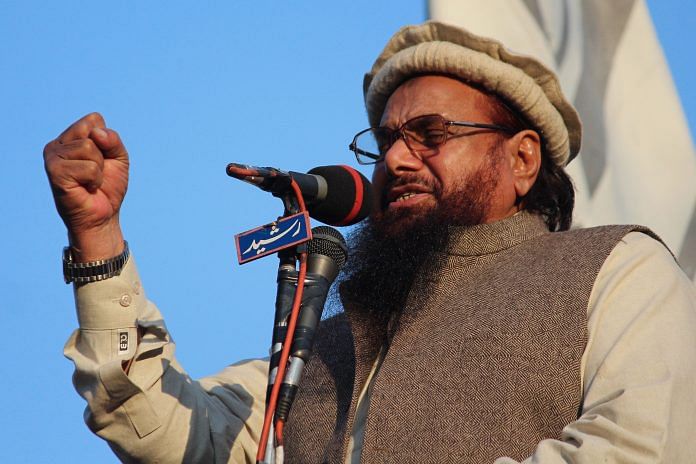Hafiz Saeed’s organisations are portrayed as charities and run hospitals & schools. His latest move was to float a political party, a way to ‘legitimise’ himself.
New Delhi: Monday marks the tenth anniversary of the horrific terror attack on India’s financial capital Mumbai which killed 166 people and wounded 400. But its Pakistani mastermind, Hafiz Saeed, continues to remain free with not even “criminal charges” against him.
His organisations, the Jamaat-ud-Dawa (JuD) and the Falah-i-Insaniyat Foundation (FiF), are no longer banned outfits and Saeed has only grown stronger over the years, even flirting with mainstream politics.
Saeed has been “detained” several times — mostly as house arrest — but he has been released sooner or later. Each time his outfit is banned, it re-emerges under a new name. Despite international pressure, he continues to enjoy the support of the Pakistani state and the country’s military.
What makes Saeed and his Jamaat-ud-Dawa so powerful? How is he able to get away with such serious charges, each time? Why, despite the threat of US sanctions, Pakistan has not been acting against him? What will be the implications if he wins an election in Pakistan? ThePrint examines these questions on the tenth anniversary of the 26/11 Mumbai attack.
Also read: Hotel Mumbai provides a raw & rare look behind 26/11 Mumbai terror attack
The JuD and FiF Empire
An Indian investigator explained that one of the reason’s for the state patronage is that Saeed’s organisations contribute significantly to the country’s economy. “It is unreasonable to expect coercive action against Saeed or his organisations — JuD and FiF,” he said.
The JuD and FiF are currently both portrayed as charities. They run the largest chain of hospitals, English-medium schools, a chain of ambulances, public libraries and are big in the industrial and banking sectors.
“The Al Aziz hospitals run by the organisations not only offer free medical checkups but also courses in medicine and dentistry,” an investigator said.
Saeed’s organisations have not only worked to build a network but also have a good public image — thanks to a media management cell.
They continue to operate freely, are often at the forefront of relief efforts following natural disasters, despite the US placing JuD on a national watch-list, following the Mumbai attack, and the UN imposing sanctions on the charity.
“After the 2008 attack, there was a lot of naming and shaming but Saeed continued to flourish in the state’s lap. It is clear that Pakistan will not take any action against him because it cannot afford to,” another investigator said.
Also read: Satellite images show Sindh safe-house where Kasab & other 26/11 attackers likely trained
The rise
The Jamaat-ud-Dawa was originally called the Marquas-ud-Dawa-Wal-Irshad (MDWI), also known as MDI.
The MDI’s militant arm is the Lashkar-e-Taiba (LeT), established by Saeed in 1985.
The MDI, under Saeed’s leadership, resembled an army unit. There were commanders in charge of different geographical areas, responsible for recruitment and intelligence gathering, camps were set up to train jihadists and then there were accountants who dealt with funds flowing from Middle-Eastern countries.
The organisation ran separate departments, including that of external affairs. The Lashkar, its militant wing, established close ties with other jihadi groups in the Middle-East and Southeast Asia, for the expansion of the radical Wahhabi school of thought.
It was in 1994 that the state of Pakistan began extending support to MDI (now JuD), after the organisation began investing its resources in the social welfare sector, including in education, farmer welfare and healthcare.
No longer banned
A Pakistani presidential ordinance that proscribed the JuD and FiF under a UN resolution has lapsed, following which the ban on the two organisations has been lifted.
After the ban was lifted, the United States in early November, asked Pakistan to enact a legislation to formally ban both organisations.
The US also said that the removal of the ban would jeopardise Pakistan’s ability to meet its commitments to fight terrorism under the UN Security Council resolution, but no action has been taken yet.
Saeed has, instead, floated a political party, the Mili Muslim League, which hopes to fight future elections in the country.
Speaking to ThePrint, an investigator called it “an attempt to enter mainstream politics for validation”.
“He already has a wide base with his work through the JuD and FiF and now this is his chance to validate these two organisations by winning an election and formally be a part of the government and hence policy-making,” the investigator said. “Till now, he was just acting as an exterior force but with this move, he is seeking public legitimacy.”



